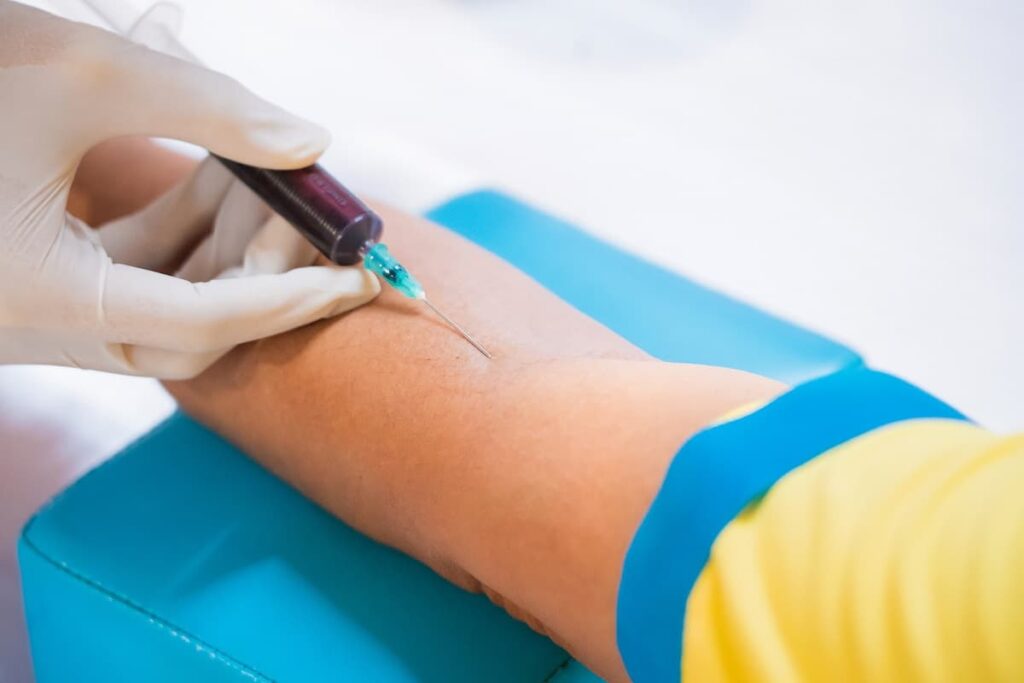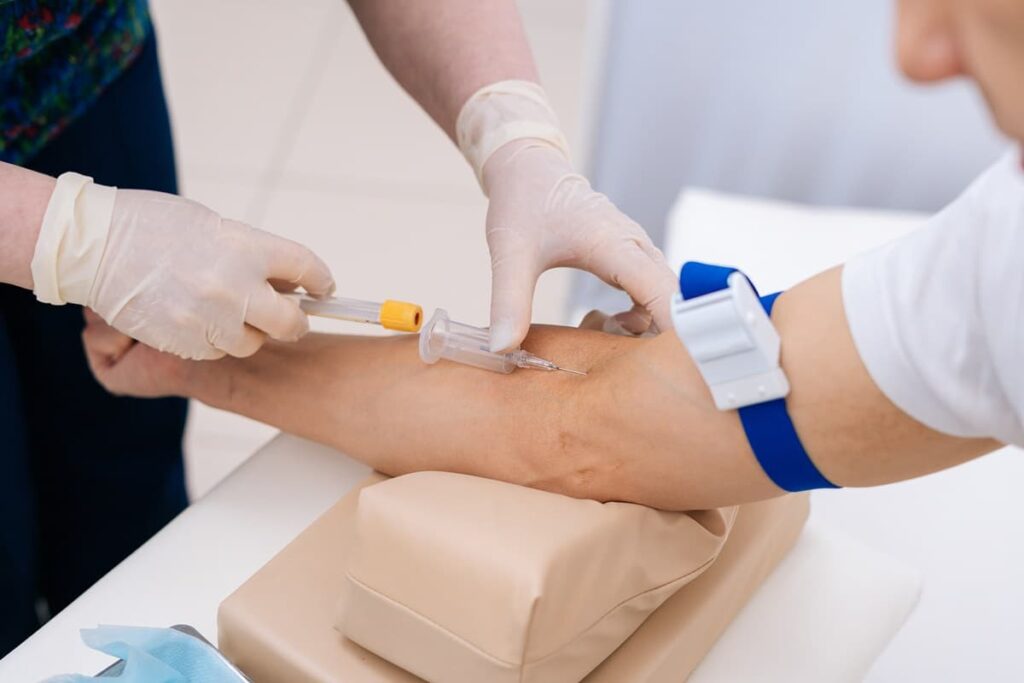Natera Stock Expands into Cancer Blood Testing
Table of contents

To say it’s been a tough year for retail investors would be an understatement. That’s especially true for technology stocks, with the Nasdaq down 35% for the year compared to about a 20% drop for the S&P 500. Interestingly, biotech stocks haven’t done as bad, based on the broad NASDAQ Biotechnology Index (NBI), which currently tracks 273 biotech and pharmaceutical companies. It only lost about 13% in 2022, as the clock winds down on another year. Of course, there are plenty of biotechs that fared much worse, including some in our own Nanalyze Disruptive Tech Portfolio.
Take Guardant Health stock (GH), which has taken a beating this year. In May, we wrote about the coming storm right before the liquid biopsy company released its Q2-2022 results. At the time, our original thesis that Guardant Health is well positioned to be a leader in the emerging cancer blood-screening market was still solid. It seemed like a good time to add shares after the stock price cratered. Another precipitous drop in Guardant Health stock earlier this month, based on the somewhat lackluster results of a long-term study (at least compared to the current standard of a competitor), triggered another assessment.
While we’re still playing the long game with Guardant Health stock, we’ve devoted quite a few articles recently looking at some of its biggest competitors. One company of particular concern is Exact Sciences (EXAS), which is expanding into the liquid biopsy market after dominating the colorectal cancer screening market with its well-known poop test, Cologuard. Meanwhile, GRAIL, a subsidiary (at the moment) of Illumina, is the only company with a multi-cancer early detection test. Freenome is a private company that is still in clinical development, so less of an immediate threat to Guardant Health. And then there is Natera stock (NTRA).
About Natera Stock
We briefly profiled Natera for an article about CareDx stock, which is a pure play on organ transplant diagnostics. Both companies have developed tests that can detect miniscule bits of DNA shed from the donor organ into the bloodstream. Higher levels indicate the potential for organ transplant rejection. Natera is a relatively recent entrant into the market, having first made a name for itself in non-invasive prenatal testing (NIPT). In fact, we first covered the Silicon Valley company way back in 2014 as part of a series of articles about NIPT. Eventually, we concluded that the market appeared to be slowing down and lost interest in the theme. That might have been a wee premature on our part, and we’ll revisit that assumption shortly.
Natera is also pushing into the liquid biopsy market, and in 2021 received breakthrough designations from the FDA for Signatera, a blood test that can help detect the potential recurrence of certain cancers after treatment. It also has a couple of other oncology tests in its portfolio, including Altera, which provides a genetic profile of a tumor from a tissue sample.

Unlike Exact Sciences, which has spent heavily to expand beyond its flagship test Cologuard through acquisitions, Natera has apparently developed its blood-testing platform internally for NIPT, organ transplants, and cancer. That’s reflected in the $264 million the company spent last year in R&D on about $625 million in revenue – underscoring the fact that clinical trials ain’t cheap. As you can see, revenue growth has been strong, while losses are also piling up:

Despite being unprofitable since its 2015 IPO, Natera stock had followed the trajectory of other high-growth stocks since 2019. Of course, this year has been a different story: Natera stock is down more than 55% in 2022, though still up by about 340% over the last five years. Compare that to funds that track broad tech indexes, such as the Invesco QQQ Trust (QQQ), which has gained just 66% during the same time period. On the surface, Natera appears to be a strong play, as it expands its blood-testing technology for detecting cell-free DNA into other applications.
Market Analyses for Natera Stock
As they say, past results do not guarantee future returns, so let’s see what the future looks like for Natera by diving into its current business models for these three markets – NIPT or women’s health, organ transplants, and cancer liquid biopsies.
NIPT Screening Market
For most of the company’s history, its women’s health tests have been its bread and butter. Its flagship NIPT product, Panorama, screens for genetic diseases such as Down’s syndrome in pregnant women. Last year, it released results from its new Panorama AI, which had been trained on more than two million tests and validated in a clinical study with more than 20,000 participants. Its other key product in this category, Horizon, is a genetic carrier screening test that identifies the risk of a parent passing on a genetic condition to a child. In the Q3-2022 earnings call, Natera management said it believes the NIPT market is “only about 45% to 50% penetrated, so there’s still a large opportunity to help more patients.” That’s certainly one way to spin it.

Considering that Panorama and Horizon still account for a “significant majority” of total revenues – let’s conservatively call it $500 million out of $567 million in product (i.e., testing) revenue, since Natera doesn’t break it down for us more explicitly – that would suggest a total addressable market somewhere just north of $1 billion. Last year, the company performed about 1.57 million tests. Way back in 2015, we estimated the total addressable market (TAM) for NIPT at 3.15 million tests per year, which still seems to jive (more or less) with the numbers we’re seeing from Natera.
In other words, we still believe the ceiling for NIPT and related genetic testing is relatively low. In addition, the NIPT market is facing several headwinds. For instance, while insurance coverage for the core Panorama test that detects more common genetic diseases like Down’s syndrome is pretty comprehensive, reimbursement rates remain low. In addition, many third-party carriers do not reimburse for microdeletion screenings, which are small missing pieces of chromosomes that can cause rare genetic disorders. A New York Times article in January 2022 claimed that positive results on those tests are incorrect about 85 percent of the time. The same article noted that in 2020 Natera performed more than 400,000 screenings for one microdeletion (the one in the Panorama AI study) – the equivalent of testing roughly 10% of pregnant women in the United States. In April 2022, the FDA warned the public against blindly following the results of NIPT screenings.
These findings do not appear to be hurting revenues much. In Q3-2022, product revenues (mostly NIPT screenings) jumped nearly 30% compared to the third quarter in 2021. However, we believe that the company’s long-term growth will need to come from its other cell-free DNA tests.
Organ Transplant Screening Market
In 2019, Natera rolled out its Prospera platform for early detection of organ transplant rejections. It has tests for kidney, heart, and lung transplants. The company estimates the TAM for these three tests is more than $2.75 billion, which is in the same neighborhood as our $4 billion estimate from the CareDx breakdown of the organ transplant rejection market. A recent study showed that the Prospera Kidney outperformed the standard diagnostic donor-specific antibody (DSA) test by nearly 20 points in predicting rejection:

At this point, it doesn’t sound like the Prospera tests outside of the kidney one are yet contributing to revenue. Meanwhile, CareDx has a healthy head start.
Cancer Testing Market
The cancer screening and diagnostic market is obviously where Natera is betting on its long-term future. The company has published 35 peer-reviewed studies on Signatera for recurrence and treatment monitoring across multiple kinds of cancer, including in big-time publications like Nature Medicine. It estimates a TAM of more than $15 billion. That doesn’t include the $6 billion market opportunity for Altera, a tissue-based biopsy test that is designed to help cancer therapy selection based on tumor genomic profiles. For 2022, Natera expects to perform 175,000 Signatera and Altera tests, representing growth of about 130%.

In addition, the company says that roughly a quarter of the 12,000 community oncologists in the United States have ordered a Signatera test in the past quarter.
Should You Buy Natera Stock?
In fact, the oncology business is the main driver behind the company’s recent announcement that it was raising its full 2022 revenue outlook to fall between $810 million and $830 million, while burning through a similar amount of cash as last year:

The cash burn is certainly a concern, even with about $520 million in cash and other assets to cover the continued losses. The $320 million in total debt isn’t crushing, but it all adds up to the fact that Natera will need to figure out a way to become breakeven sometime in 2024 or look for other ways to fund its operation – including shareholder dilution.
But there are other reasons to avoid Natera stock. Between the New York Times article in January and the FDA announcement in April, the activist short-selling research firm Hindenburg Research released a short report on the company titled “Natera: Pioneers In Deceptive Medical Billing” in March. The gist of the allegations is that the company’s revenues have been “fueled by deceptive sales and billing practices aimed at doctors, insurance companies and expectant mothers.” Natera naturally denied the allegations at the time. In the Q3-2022 presentation, company management said an independent third-party investigation by international law firm WilmerHale “concluded that the allegations of wrongdoing against the company in the report were unfounded.”
That hasn’t stopped government regulators from snooping around, though there doesn’t appear to be an official investigation underway. However, Natera is currently engaged in a number of unrelated lawsuits, mostly revolving around patent disputes. It has been battling CareDx since at least 2019 over patents related to organ transplant rejection tests. It has also filed lawsuits against precision oncology company ArcherDX and its parent company, Invitae (NVTA), a biotech leader in medical genetics that is also having a pretty tough year. Natera has also been involved with lawsuits and counter-suits with Guardant Health. And this is by no means an exhaustive list. Too much drama for our tastes.
Conclusion
Natera offers investors diverse exposure to several markets through its blood-testing technology that detects miniscule bits of genetic material from placenta DNA, donor DNA, and tumor DNA. The company is the market leader in the first, challenging a long-standing incumbent in the second, and faces a large field of competitors in the third. Natera is pouring hundreds of millions of dollars into R&D that could make it a leader in genetic testing – if it doesn’t go bankrupt first. Since our portfolio is already heavily invested in life sciences, we see no reason to add Natera stock, which comes with a lot of financial and regulatory risk at this time.
Sign up to our newsletter to get more of our great research delivered straight to your inbox!
Nanalyze Weekly includes useful insights written by our team of underpaid MBAs, research on new disruptive technology stocks flying under the radar, and summaries of our recent research. Always 100% free.
















They burn $120M per quarter while making revenue $210M. P/S = 5. For comparison EXAS has P/S = 4.1.
So EXAS is cheaper and looks like a safer bet.